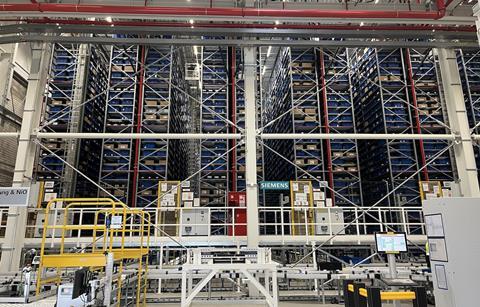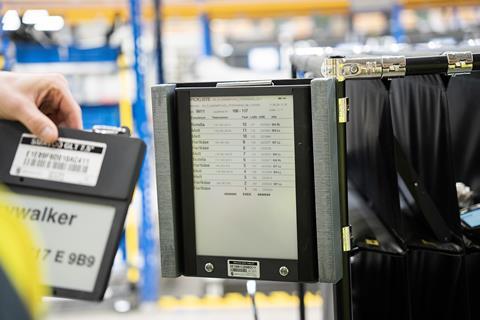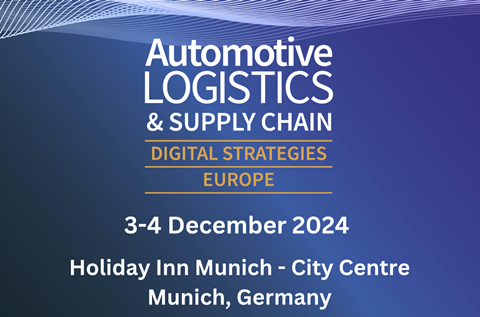Volkswagen’s Mirko Bührmann appears to have a clear and simple order. The logistics planner has only written down three things on his shopping list: Nutella, two jars, Mett (raw pork), five portions, and hard cheese, also five portions. However, the ’supermarket’ Bührmann is shopping in is in fact his professional home – VW’s assembly plant in Emden, northwest Germany. This is where he coordinates orders for small parts.

The food items are in fact substitutes for long codes and are designed to more easily guide workers to the right shelf in the automotive parts storage unit to find what they need. Bührmann is striving to ensure greater efficiency at the Emden plant by adopting a more familiar supermarket principle. At the same time, however, he is working on banning all paper shopping lists from the plant. The paperless supermarket is just one example of how VW is trying to continuously optimise its plant logistics at Emden. Bührmann’s boss, logistics manager Sebsatian Schmickartz, is visibly proud of everything that has recently happened at the Emden VW plant.
Centralised high bay
Schmickartz shows off the new high-bay warehouse, which was built between June 2021 and March 2023 for €42m. The goods receipt area is in Hall 9. The warehouse has capacity for 16,000 large and 70,000 small load carriers. Schmickartz is particularly proud of the fully automated storage and retrieval, which enables goods to be processed efficiently and quickly. The automatic depalletizing and the automatic tugger train stations also contribute to the high level of efficiency. However, the biggest advantage of the new high-bay warehouse is probably the elimination of external storage areas. By centralising storage VW was able to cut out 74 daily truck trips. This not only leads to considerable cost savings, but also to a reduction in CO2 emissions by 123 tons per year. VW expects to save around €16m annually as a result.
To become independent of state-run Deutsche Bahn, VW signed a contract with the Smartrail Logistics in 2018, which in turn has exclusive rights to certain railway lines. SmartRail Logistics is a joint venture between LIT Speditions and Captrain Deutshland. From the main hub around Dresden, five trains now travel independently from eastern Germany to the northwest of the country. This alone has enabled the company to save around 26m truck kilometres in the six years it has been operating. In addition, Emden has its own trailer yard with 540 metres of tracks.
Rail plays its part in supporting electric vehicle production at Emden, which began in December 2021. VW invested around €1.3 billion in Emden for the transformation to production of vehicles based on its modular electric drive matrix (MEB) and it now makes the ID.4, ID.7 and ID.7 Tourer (see also our coverage of rail supported battery logistics at VW’s Zwickau plant).
VW Group Logistics has developed a battery transport system using special containers to move battery cells by rail from suppliers in Poland to powertrain facilities in Braunschweig, in Lower Saxony, and then to its German EV plants in Emden and Zwickau, in Saxony and to Skoda’s plant in Mlada Boleslav, near Prague, Czech Republic.

Dedicated to outbound
For outbound shipments of the finished vehicles VW uses the port of Emden, which exclusively handles VW Group vehicles and is managed by VW Group Logistics in conjunction with Autoport Emden. VW Group said that around 600 ships, 160,000 railcars ad 35,000 trucks call at the port to deliver and collect vehicles every year.
Imported vehicles from Portugal, Spain, Mexico and South Africa are distributed across Europe from Emden and VW Group exports vehicles across the world from Emden, including to the US and Canada, Mexico, Japan, Taiwan, Spain, Portugal and the UK. In 2023, around 1.3m vehicles were shipped through the port of Emden. Around a third of these were battery EVs and plug-in hybrids.
VW Group has reported dealing with longer vehicle dwell time at the Emden terminal because of a shortage of truck capacity, caused by the driver and equipment shortages affecting Germany and wider Europe. That comes on top of car carrier capacity problems originating from the Covid pandemic. However, a spokesperson for VW said that Volkswagen Group Logistics had managed the shortage well, “especially by using more long-term agreements with service providers and chartered vessels which can be used flexible on different routes where needed”.

























![Global[1]](https://d3n5uof8vony13.cloudfront.net/Pictures/web/a/d/s/global1_726550.svgz)














No comments yet